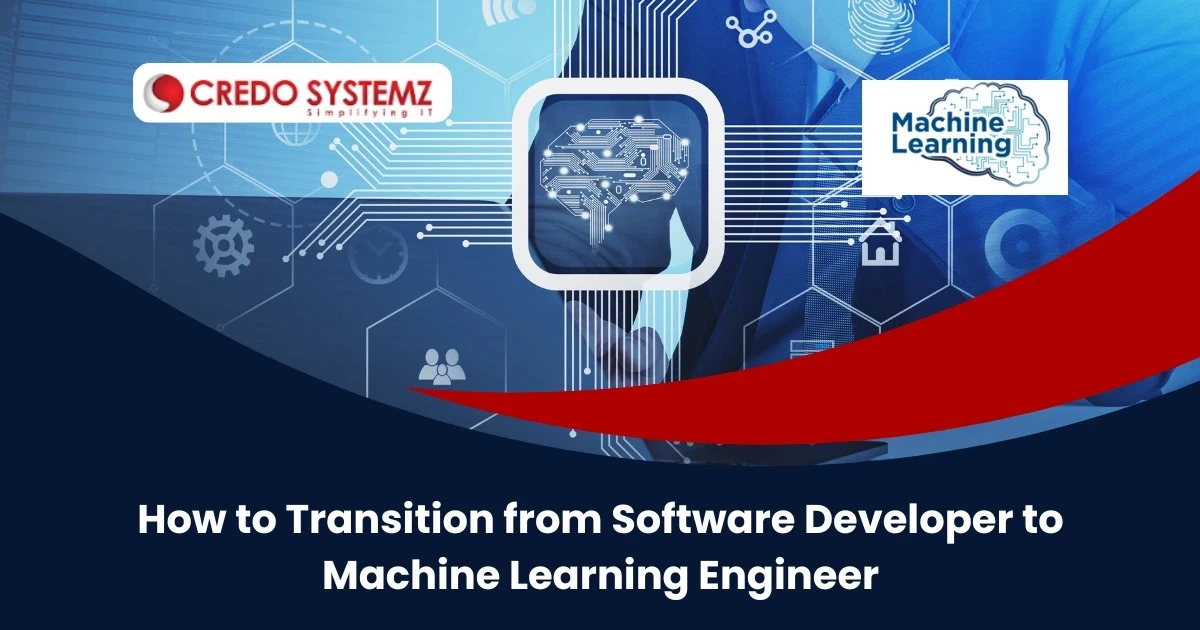
From Software Developer to Machine Learning Engineer
In today’s tech world, the transition from a Software Developer to a Machine Learning (ML) Engineer is highly common and an exciting journey. It opens up various job opportunities to work on cutting-edge technologies with AI-driven applications. This guide will help you to understand about machine learning, the essential skills, and best practices to make the career shift smoothly.
Role of a Machine Learning Engineer
Machine Learning Engineers are in-demand professionals who are responsible for designing, developing and deploying machine learning models. They bridge software development and by involving in:
- Designing and implementing machine learning models and systems. Deploying ML models into production.
- Managing data pipelines and preprocessing data. Optimizing and maintaining ML systems
- Collaborating with data scientists, DevOps engineers, and domain experts.
Mathematical and Statistical Foundations
As ML relies on mathematics and statistics, the key areas to be focused on includes:
- Linear Algebra: Matrices, vectors, eigenvalues, singular value decomposition
- Probability & Statistics: Bayes’ theorem, distributions, hypothesis testing
- Calculus: Derivatives, gradients, optimization techniques
- Optimization: Gradient descent, convex optimization
Learn Machine Learning Concepts and Algorithms
The important machine learning concepts which are essential to become a machine learning professional are:
- Supervised vs. unsupervised learning
- Regression, classification, and clustering algorithms
- Decision trees, random forests, SVMs, and neural networks
- Deep learning fundamentals, CNNs, RNNs, and transformers
- Model evaluation metrics
Python and Machine Learning Frameworks
Python is the dominant and popular language which is widely used in machine learning with essential libraries such as:
- NumPy, Pandas, Matplotlib, Seaborn for Data manipulation and visualization)
- Scikit-learn to build Machine learning algorithms and evaluate ML models
- TensorFlow & PyTorch for Deep learning frameworks)
- OpenCV to create Computer vision applications
Hands-on Experience with Data Handling and Engineering
To switch your career into the machine learning field, practical experience is essential by working with real-world datasets from Kaggle, UCI Machine Learning Repository and Google Datasets.
Learn about SQL to create SQL queries for structured data and Apache Spark which is suitable for big data processing. Feature engineering and data preprocessing techniques are important to look into.
Model Deployment and MLOps Skills
Machine Learning Engineers are not only responsible for building models but also should learn to deploy and monitor them using:
- Flask and FastAPI
- Docker & Kubernetes
- CI/CD Pipelines
- Cloud Platforms
Work on Real-World ML Projects
As practical experience is crucial, Credo Systemz offers the expert-led machine learning training in Chennai to gain the knowledge and practical skills of machine learning. We ensure hands-on sessions to learn the Implementation of ML models on projects like recommendation systems, fraud detection.
Our structured machine learning training assists you to build professional skills with certification and placement support. We offer live ML training, skilled trainers, industrial practicals and projects.
Conclusion
To sum up, transitioning from software development to machine learning requires dedication, effective learning, hands-on practices and projects. By focusing on mathematical foundation, mastering ML algorithms and gaining practical experience, successfully make the shift and thrive in the field of ML engineering.
